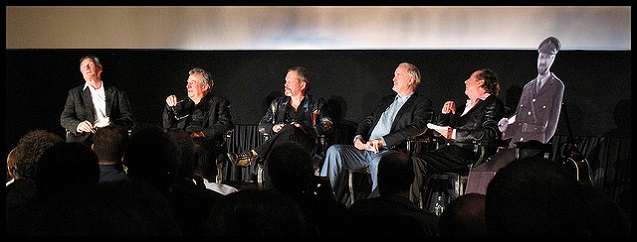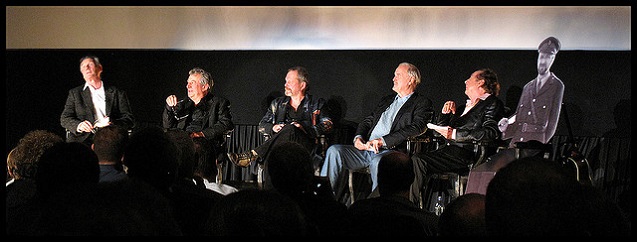
Part of the Series
Moyers and Company
 Chris Miller / Flickr)” width=”637″ height=”242″ />Monty Python reunion. (Photo: Chris Miller / Flickr)
Chris Miller / Flickr)” width=”637″ height=”242″ />Monty Python reunion. (Photo: Chris Miller / Flickr)
For a very good reason, this year my girlfriend, Pat, and I were in London for the Fourth of July. The British feigned indifference to the anniversary of our breakaway, like disappointed parents choosing not to mention the unruly prodigal who dropped out, left home and, in spite of their warnings, did okay.
Frankly, I think they’re being a little too defensive. One July Fourth a number of years ago, a college friend of my brother’s was unceremoniously tossed from the visitor’s gallery of the House of Commons for shouting, “Taxation without representation is tyranny!” Sore losers.
But there we were, staying at a hotel near the Tower of London, just a couple of minutes’ walk from the spot where Thomas More of A Man for All Seasons fame was beheaded in 1535, followed to the chopping block just five years later by his enemy Thomas Cromwell. Thanks to Henry VIII, the monarch behind both deaths, it’s a textbook example of what goes around, comes around.
(For a fascinating revisionist view of this bleak period in Tudor history, the Royal Shakespeare Company’s in London performing a two-part adaptation of Hilary Mantel’s novels Wolf Hall and Bring Up the Bodies. There’s also a BBC version on the way, with Damian Lewis, late of Homeland, playing Henry.)
I mention this in part because Cromwell’s execution was ordered via a bill of attainder – a parliamentary act pronouncing guilt without trial – and that’s one of the many abuses of power that had Americans demanding freedom in the first place. The Founders went on to explicitly ban letters of attainder in the Constitution. Another cause for celebration, unless, of course, you’re in Guantanamo.
Nevertheless, because we were temporarily back under the thumb of our colonial oppressors, there were no fireworks for us this year, no parades, barbecues or picnics. But there were the sounds of John Philip Sousa, the usual accompaniment to Independence Day festivities. That’s because we were lucky guests at a performance of Monty Python Live – Mostly and before it began the hall was filled with Sousa’s music — the familiar Python theme song is his Liberty Bell March.
Python’s why we were in London. When I first moved to New York, I worked in publicity, and one of my first assignments was Monty Python’s Flying Circus. My friend Nancy Lewis and I endeavored to popularize the show on American public television. It took off like a Roman candle, not so much because of our efforts, but because it was smart, anarchic and hit a national nerve at a propitious moment, just as the sins of Richard Nixon, Watergate and Vietnam were fading to black and the country was ready for something entertaining, clever and far too silly.
At one point, we flew four of the group over for a press tour and public TV pledge week, and with them came a small can of film that contained two edited sequences from Monty Python and the Holy Grail – fans will know the Black Knight scene and the Knights of the Round Table number. An American distribution deal was secured.
This was all, gulp, some 40 years ago. Fast forward to the Monty Python Live — Mostly reunion of the guys (minus the late Graham Chapman; hence the “Mostly”) in the cavernous O2 Arena. The O2 holds 20,000 people, but all the high-priced tickets to the Python shows were sold out in next to no time, the first in less than a minute. Inside, Python merchandise was on sale everywhere and vendors hawked printed souvenir programs for a stunning 20 pounds – that’s a little more than $34. Apiece. We all had come a long way.
Many of the old familiar sketches and songs were there, now presented in lavish, extravagant style – Dead Parrot, Cheese Shop, Nudge, Nudge, Argument Clinic, Nobody Expects the Spanish Inquisition, the Spam and Lumberjack Songs, Always Look at the Bright Side of Life , and more.
Doubtless, everyone in attendance had favorite bits that didn’t make the cut for these allegedly final performances. For me, one of those was a piece called The Money Programme in which Python Eric Idle, as the host of a financial chat show, becomes more and more erotically obsessed with his subject matter: “Some of it in nice piles, others in lovely clanky bits of loose change, some of it neatly counted into fat little hundreds…Beautiful, wayward, curlicued banknotes, filigree-copperplating cheek by jowl with tumbling hexagonal milled edges, rubbing against the terse leather of beautifully balanced bank books…” and so on until be bursts into frantic song.
It was written decades ago, pre-CNBC, Fox Business and Bloomberg TV, and our money mania has only grown exponentially. America and the UK may yet be an ocean apart and separated by a common language but we share a bond of vast wealth at the very top and grievous economic inequality. Just look at the corporate building boom, excessive real estate prices, soaring retail rates and traffic jams in the center of London, contrasted with the homeless and poverty-stricken on its streets. All of it similar to New York’s; the parallels are clear. According to The Guardian newspaper, British food bank use has increased 163 percent in the last year. An inquiry has found that since 2003, food costs are up 46.4 percent and fuel costs have increased 154 percent while earnings have only risen by 27.9 percent.
So, too, are the parallels strong when it comes to the corrupting influence of money in politics. While we were in London, the Conservative Party raised half a million pounds ($854,000) plus probably several hundred thousand more via “table sales” at its annual summer fundraising ball. Lobbyists and their clients, some of them with ties to the Kremlin, sat well-fed cheek by well-fed jowl with well-fed cabinet ministers. Top prize at its auction, the chance to play in a celebrity tennis match with Prime Minister David Cameron and London Mayor Boris Johnson, sold for £160,000 ($273,300), and was won by Lubov Chernukhin, wife of Vladimir Putin’s former deputy finance minister Vladimir Chernukhin, an oligarch with financial and real estate interests in the UK.
The Guardian reported, “A bottle of champagne signed by Margaret Thatcher sold for £45,000 [$77,000]. Other prizes at the auction included a ‘fantastic eight-gun pheasant shoot’ at Tusmore, the Oxfordshire estate of the Syrian-born billionaire, Wafic Said, which one guest told The Guardian sold for £80,000 [$137,000]. The source added that the auctioneer, foreign office minister Hugo Swire, put up a jar of honey made by his own bees, saying he wanted it to become the most expensive pot of honey ever sold. It went for £15,000 [$25,700], the source said.” I’m not making this up.
A former chair of Britain’s nonpartisan Committee on Standards in Public Life told The Independent newspaper, “It’s shocking that you can pay for such secret access. If you have a formal meeting with a government minister you would have to disclose that… The whole lobby is a central issue that the political system has to get to grips with.”
Meanwhile, rumors flew that the new chair of the United Kingdom’s government agency that regulates and inspects schools, daycare and teacher training, among other functions, may be a fellow named David Ross, a cellphone magnate and playboy who also happens to oversee a trust that sponsors a chain of schools. His estimated worth is £892 million – more than a billion and a half dollars. According to The Guardian, “Ross, 48, is estimated to have donated hundreds of thousands of pounds to the Conservative party, with prominent Tories known to have been visitors to shooting parties at his sprawling country estate in Leicestershire.” In the world of Python, these types would take first place in their “Upper Class Twit of the Year” competition.
The prospect of Ross’s appointment prompted The Independent to editorialize that “our funding of political parties remains dominated by the generosity of rich individuals, most of whom have active business interests.
“In the broader view, it is in the Conservative Party’s own interest to bring in limits on the amount that any one can donate to a political party. Given that one of the Tories’ greatest weaknesses is that they are seen as the party of the rich, the scale of its funding by the rich is an embarrassment. Money from millionaires can buy slicker advertising than Labour or the Liberal Democrats can afford, but its source must offset some of its persuasive power.”
Granted, the amount of political money spent in the UK may seem like chump change compared to the hundreds of millions of dollars in campaign contributions thrown around in the US by such Americans as the Kochs, Sheldon Adelson, Tom Steyer and the like. But to be fair, Britain has only one-fifth our population. And as the old joke goes, we’ve established the principle, now we’re just haggling over the price.
Time, as Monty Python famously said, for something completely different. In the face of heavy opposition from the moneyed classes on either shore, both the United States and the United Kingdom are desperately in need of campaign finance reform. No joke.
Our most important fundraising appeal of the year
December is the most critical time of year for Truthout, because our nonprofit news is funded almost entirely by individual donations from readers like you. So before you navigate away, we ask that you take just a second to support Truthout with a tax-deductible donation.
This year is a little different. We are up against a far-reaching, wide-scale attack on press freedom coming from the Trump administration. 2025 was a year of frightening censorship, news industry corporate consolidation, and worsening financial conditions for progressive nonprofits across the board.
We can only resist Trump’s agenda by cultivating a strong base of support. The right-wing mediasphere is funded comfortably by billionaire owners and venture capitalist philanthropists. At Truthout, we have you.
We’ve set an ambitious target for our year-end campaign — a goal of $150,000 to keep up our fight against authoritarianism in 2026. Please take a meaningful action in this fight: make a one-time or monthly donation to Truthout before December 31. If you have the means, please dig deep.